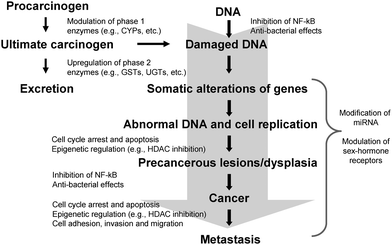Cruciferous vegetables such as broccoli, cabbage and cauliflower have been associated with a decreased risk of gastrointestinal, lung and prostate cancers. In their recent review article, Johanna Lampe and colleagues from the US provide an update on the proposed mechanisms of action behind this observed cancer chemoprevention.
 Vegetables from the Brassicaceae family (such as cabbage and Brussels sprouts) contain significant amounts of sulfur-containing glucosinolates which are converted to bioactive compounds such as indoles and isothiocyanates during digestion. It is these compounds which are thought to be responsible for the increased chemoprotective effects observed by cruciferous vegetable consumption compared to other fruits and vegetables. It is concluded that a systems biology approach may help our understanding of these compounds because such a wide variety of isothiocyanates are produced from glucosinolates and there are many diverse pathways on which they act.
Vegetables from the Brassicaceae family (such as cabbage and Brussels sprouts) contain significant amounts of sulfur-containing glucosinolates which are converted to bioactive compounds such as indoles and isothiocyanates during digestion. It is these compounds which are thought to be responsible for the increased chemoprotective effects observed by cruciferous vegetable consumption compared to other fruits and vegetables. It is concluded that a systems biology approach may help our understanding of these compounds because such a wide variety of isothiocyanates are produced from glucosinolates and there are many diverse pathways on which they act.
To read the full article for free, click the link below:
Mechanisms of action of isothiocyanates in cancer chemoprevention: an update, Sandi Navarro, Fei Li and Johanna Lampe, Food Funct., 2011, DOI: 10.1039/c1fo10114e










